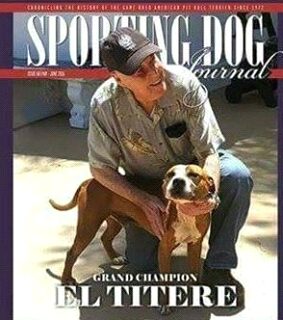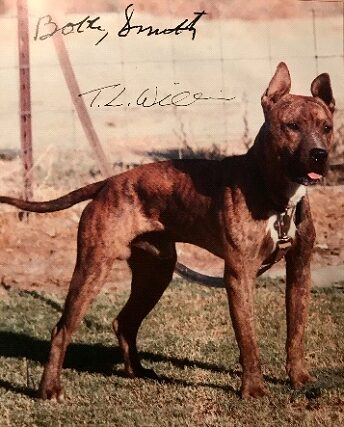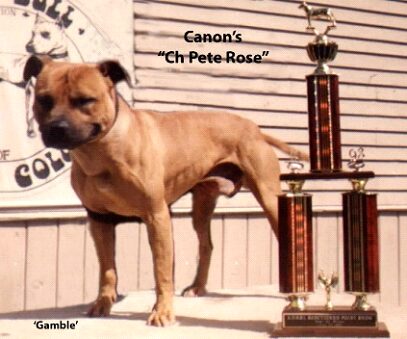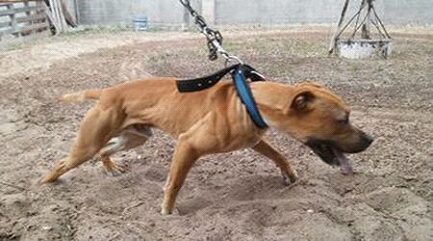Search Posts
Recent Posts
- The Long Goodbye January 18, 2024
- Once More Around the Mulberry Bush January 9, 2024
- The Wash December 28, 2023
- The Truth About Carver Dogs December 1, 2021
- The Question of Pain November 9, 2021
Categories
Subscribe!
Thanks for subscribing! Please check your email for further instructions.
Destroyers versus Gameness
1. Motorhead is showing the typical intensity of a game Bulldog when he spots something of interest.

2. California Jack was a litter brother to Blue Monday. Both dogs had talent and were game.

3. Champion Dexter is a much-admired dog.

4. Champion Game James is a son of the immortal El Titere, and his name says it all (game).

5. Chamuco was a destroyer who proved himself to be quite game, too.

6. Charlie Brown is a pet, but he’s down from game stock.

7. This is a picture of me with El Titere on the cover of the magazine because he is considered one of the greatest of all time.

8. This is the great El Titere (ET) relaxing.

9. This is Fox, a brother to Badger who was a destroyer and never had to prove his gameness. Fox did, and he has produced better dogs than Badger (although Badger has done well, too).

10. Gamble was a game, rugged dog that was good enough to be the foundation of a respected bloodline, that of Canadian Pete.

11. Grand Champion Mayday had it all, deep gameness and ability, and he is back in many pedigrees.

12. Kane is one of the classiest dogs I’ve ever seen, but he never had to prove deep gameness because he so dominated two particularly good opponents.

There seems to come a time in every serious dog man’s life that he decides gameness isn’t so important if you have a destroyer. At one time, it seemed that you simply needed a game dog to win, but of course, that’s not always the case. One of the earliest examples I can remember was Searcy Jeff, back in the 40s. He was owned by Dr. Hall, and Bob Wallace bought him because after the first two matches, in which he nearly decapitated his opponents, Hall couldn’t get him matched any longer, so he was willing to sell him—but for a handsome price.
The old timers were skeptical of destroyers like Searcy Jeff, as you couldn’t be sure that they were game because they never had to prove it. Wallace was always a crank on gameness, and he wasn’t about to start his line based on a dog that might be lacking in that department—no matter how much of a destroyer he was!
Wallace was a young man then, and he intended to make sure that Jeff was game. The only way to do that was to use one dog after another on him. Wallace used three. He had Frank Fitzwater there to help him, and he was still alive when I first heard about this, and he talked about that game test, too. The first dog he used on Jeff was bigger than him, but he walked with a limp the rest of his life. Then, they put another on him, and Jeff was getting tired by this time because the dogs they were putting on him were larger, and he was losing some of his punishing ability as the time went on. By the time they used the third dog, an hour had gone by, and Jeff was nearly helpless, but when they took the third dog away, Jeff, weak as he was, had already made some impressively game scratches, and he protested mightily about having his opponent taken away.
Now, Bob Wallace had spent a thousand dollars on Searcy Jeff, back in the forties. That would be like 100 thousand today. And yet, he endangered his prize dog by taking him close to death in a game test that proved he was game. Why was gameness so important? The old-timers were not divinely inspired. Were they wrong about the importance of gameness? Some points of view have changed with the advancement of knowledge. Is primacy of gameness something that should be reconsidered?
I suspect not. Underpinning all that ability that so infatuates dog men may be deep gameness, but most knowledgeable dog men are satisfied with pit gameness. That means the dog is game enough to win. But sometimes it isn’t. And there’s nothing that frustrates a dog man more than having his charge fail to scratch after he’s basically won the match. Nonetheless, it comes seemingly in nearly every dog man’s life that they decide that they will concentrate on the killer-type dogs, the hard punishers, and they’ll let the opponent’s dog be deep game. Or so it seems anyway. I remember when it happened to Bert Sorrells. And I must confess that if you are going to be matching dogs regularly, why not find about deep gameness for money, instead of in a roll?
But two of his biggest thrills in the sport came because of game dogs. First, there was Dugan. That was early in Sorrells’s career, and he had a son of Wallace’s Talking Boy. Talking Boy had won several matches for a guy named Mayo, and when Bert got hold of him, he won some more for him. He bred him to his Corvino’s Crazy Mary bitch and got a good litter. One of the best dogs was Dugan. Dugan wasn’t hard punishing, but he was an adept wrestler. He was good at staying out of trouble. In any case, he stopped a well-bred, highly regarded dog, simply by controlling him and not letting him do any damage. It didn’t make the fellow happy, as he had paid a lot of money for the dog—but it indicated that Dugan might be worth a bet.
He eventually won in Oklahoma, and he was voted the Best Dog in the Show, as well as the Gamest Dog in the Show. The sponsor of the event went over the rules again: It was supposed to be a different dog for each award. They voted again with the same result. What had the dog done? He had by no means been a destroyer. He had gone against a dog that was considered one of the best in the country. As slick as Dugan was, he had great difficulty handling that dog! He was just too strong and formidable. He had nearly immobilized Dugan’s front end by crippling his shoulders. Ralph Greenwood was handling the dog for Bert, and he suggested that they pick Dugan up to save him. Bert wanted to wait. At about the forty-five minutes mark, the tide began to turn. All that time, Dugan was trying to retain as much fighting ability as he could, but he had basically no front end working, but he was still full of life and ideas, and the other dog was running low on gameness. Or so it seemed. Dugan was finding ways to become a problem. He was finding ways to get through to his opponent. Before long, Dugan had his adversary down, and he was punishing him. Some of that talent that he had showed in the early rolls began to manifest themselves now. He didn’t have a lot of strength left, but he was managing to pour on enough punishment to prevail. After a couple of handles, the famous Cannon stood in his corner.
The dog men went wild—even the ones who had bet against him. Many were actually crying and kicking the side of the pit. They were in ecstasy about the type of gameness they had seen. It was as though it had just been demonstrated that in the long run, after all, it was always gameness which matters. Like most dog men, these guys had all bred primarily for gameness—or at least with gameness a major component of the dog. Now, they had seen that it could indeed prevail, and they worshipped the little dog that demonstrated that fact.
That’s why there was so much emotion in the crowd and why Dugan kept getting voted both awards. Bert always told me that was a match that thrilled him the most. I’m not sure it made a convert out of him, but it certainly inculcated into him a respect for gameness that may have been diluted before. He always maintained that the Dugan-Cannon match was his biggest thrill in the game.
Sometimes it can be the other way around. Bobby Smith had bought Bad Billy just because he wanted one of those destroyers that he had admired so much but never owned. He won several matches with him, as planned. But eventually Billy was matched against a dog with near equal ability in an arena that went against Billy’s style. His most devastating move was to get up under a dog and lift him by the chest, allowing the dog’s own weight to work against him here. The weight of his opponent helped Billy punish in the chest area. But in this case, there was a tight, slick tarp on the floor of the pit. That worked against Billy, as when he tried his move, his front legs slipped out to the side in a split. That happened again and again. It worked so much against Billy that he was clearly losing. Bobby left him down too long, expecting him to pull off a win, as usual.
With his dog dead tired and nearly dead, Bobby didn’t expect him to scratch, but he did! He made an incredibly game courtesy scratch that brought the crowd to its feet and Bobby to tears. His dog was more than just “pit game†after all—and for that reason, I think he exalted Bad Billy above all the other fine dogs he owned during his lifetime.
Everyone loves destroyers, and I’m not immune to that—but gameness is truly special. Some dog men so revere deep gameness that they consider it to be a spiritual trait. I don’t believe that, but I have often been surprised by a clever game dog beating a destroyer that was formerly regarded as unbeatable.
Great read as usual. Not a dog man of your caliber, but, in my 10 yrs of breeding bulldogs, I’ve not seen any great dogs, but I’ve witnessed gameness.
If I have to pick, I’ll take gameness.
Thx again sir
Yes, I agree, of course, and I appreciate your comment.